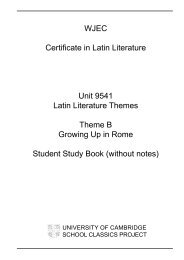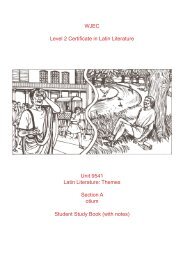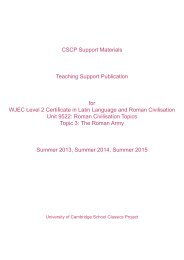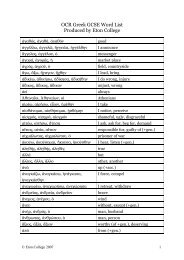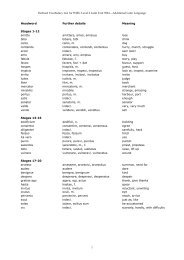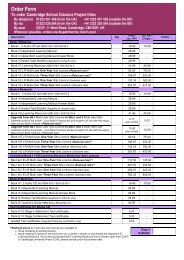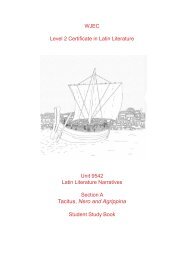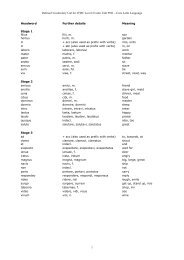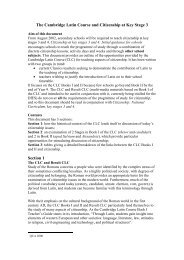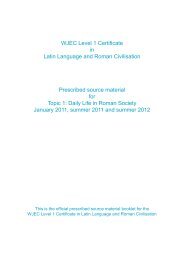Pliny, Letters 4.19, To Calpurnia Hispulla, his wife’s aunt – lines 11-15eadem, siquando recito, in proximo sedet, velo discreta,laudesque meas avidissimis auribus excipit. versusquidem meos cantat formatque cithara, non artificealiquo docente, sed amore, qui magister est optimus. 1511 idem, eadem, idem - the samesi - if12 quando - wheneverrecito, recitare, recitavi, recitatus - give arecital, read aloudin - inproximum, proximi, n. - neighbourhood,vicinitysedeo, sedere, sedi - sitvelum, veli, n. - curtaindiscerno, discernere, discrevi, discretus -hide, screen, separate13 laus, laudis, f. - praise-que - andmeus, mea, meum - myavidus, avida, avidum - eagerauris, auris, f. - earexcipio, excipere, excepi, exceptus - receive,listen toversus, versus, m. - verse14 quidem - even, indeedmeus, mea, meum - mycanto, cantare, cantavi - sing, chantformo, formare, formavi, formatus - set tomusic; shapecithara, citharae, f. - lyrenon - notartifex, artificis, m. - artist, teacher15 aliqui, aliqua, aliquod - anydoceo, docere, docui, doctus - teachsed - butamor, amoris, m. - lovequi, quae, quod - who, whichmagister, magistri, m. - teachersum, esse, fui - beoptimus, optima, optimum - best86 WJEC Level 2 Latin Literature Unit 9541 Love and Marriage
38. Read lines 11-15 (aloud if possible) or listen to the audio on the CSCP website.39. <strong>Study</strong> the vocabulary.40. Read lines 11-15 (or listen to the audio) again.41. One way for a writer to get his work known was to read it in public to an invited audience; this event was knownas a recitatio. Pliny frequently read his work at such gatherings and conscientiously attended the recitationesof other people, grumbling in one letter about the disgraceful folk who turn up late and sneak out before the end.4<strong>2.</strong> <strong>Study</strong> one use of the word idem (feminine eadem):Sextus optimus pictor est, idemque athleta notissimus.Sextus is an excellent painter, and the same man is a very famous athlete.Or, more naturally: Sextus is an excellent painter, and also a very famous athlete.Besides organising slaves to bring news from court, what does Calpurnia also (eadem) do, as described in thewords in proximo sedet (line 12)? When does she do this? (si quando in lines 11-12 can be translated aseither if ever or whenever.)43. Find the participle in line 12 that describes Calpurnia when she attends one of Pliny’s recitationes. How is shehidden, and why?44. What does laudes meas (line 13) mean?(a) the audience’s praise of Pliny(b) Pliny’s praise of his wifeHow does Calpurnia react to the audience’s response? Which words show how emotionally involved she is?45. What does she sing (lines 13-14)? Notice the genitive singular of versus in the glossary; what declension doesit belong to? (This should help you to check the case of versus in line 13; if puzzled, see the <strong>Cambridge</strong> LatinGrammar, page 11, paragraph 4.)46. What else does she do to his verses (line 14)? What case is cithara?47. Pliny’s poetry, to judge from his occasional quotation of it in his letters, was not much good.48. Who does not teach Calpurnia to sing and play the lyre (lines 14-15)? Who, or what, does teach her (line 15)?What comment does Pliny add?49. Translate lines 11-15.WJEC Level 2 Latin Literature Unit 9541 Love and Marriage 87
- Page 1:
WJECLevel 2 Certificate in Latin Li
- Page 4:
CIL 1.2.1211, Epitaph to Claudia -
- Page 7 and 8:
NotesWJEC Level 2 Latin Literature
- Page 9 and 10:
20. Read lines 5-8 (aloud if possib
- Page 11 and 12:
Follow your teacher's guidance over
- Page 13 and 14:
13. Read lines 4-8 (aloud if possib
- Page 15 and 16:
NotesWJEC Level 2 Latin Literature
- Page 17 and 18:
28. Read lines 8-11 (aloud if possi
- Page 19 and 20:
NotesWJEC Level 2 Latin Literature
- Page 21 and 22:
47. Read lines 11-14 (aloud if poss
- Page 23 and 24:
61. Read lines 14-18 (aloud if poss
- Page 25 and 26:
NotesWJEC Level 2 Latin Literature
- Page 27 and 28:
The poems of Catullus, who lived in
- Page 29 and 30:
NotesWJEC Level 2 Latin Literature
- Page 31 and 32:
27. Read lines 7-9 (aloud if possib
- Page 33 and 34:
37. Read lines 10-13 (aloud if poss
- Page 36 and 37: Catullus, Poem 8 - lines 1-5miser C
- Page 38 and 39: 18. According to Catullus in line 3
- Page 40 and 41: Catullus, Poem 8 - lines 6-8ibi ill
- Page 42 and 43: Catullus, Poem 8 - lines 9-11nunc i
- Page 44 and 45: Catullus, Poem 8 - lines 12-15vale
- Page 46 and 47: Catullus, Poem 8 - lines 16-19quis
- Page 48 and 49: 82. Translate the last three words
- Page 50 and 51: Catullus, Poem 70nulli se dicit mul
- Page 52 and 53: (ii) The person who ought to do som
- Page 54 and 55: Catullus, Poem 72 - lines 1-4diceba
- Page 56 and 57: Catullus, Poem 72 - lines 5-8nunc t
- Page 58 and 59: Catullus, Poem 83 - lines 1-2Lesbia
- Page 60 and 61: Catullus, Poem 83 - lines 3-6mule,
- Page 62 and 63: 24. et in line 6 is more than just
- Page 64 and 65: Ovid, Ars Amatoria 1.469-478, Advic
- Page 66 and 67: 15. In time, what do these animals
- Page 68 and 69: Ovid, Ars Amatoria 1.469-478, Advic
- Page 70 and 71: 44. What is the literal translation
- Page 72 and 73: Martial, Epigrams 8.12, Marital equ
- Page 74 and 75: CheckCheckCheckTranslate these exam
- Page 76 and 77: Pliny, Letters 4.19, To Calpurnia H
- Page 78 and 79: Check12. Translate these examples:(
- Page 80 and 81: Pliny, Letters 4.19, To Calpurnia H
- Page 82 and 83: Pliny, Letters 4.19, To Calpurnia H
- Page 84 and 85: allowed in court (see question 30),
- Page 88 and 89: Pliny, Letters 4.19, To Calpurnia H
- Page 90 and 91: Pliny, Letters 4.19, To Calpurnia H
- Page 92 and 93: 77. The marriage (like Pliny’s tw
- Page 94 and 95: Pliny, Letters 6.24, Faithful unto
- Page 96 and 97: Pliny, Letters 6.24, Faithful unto
- Page 98 and 99: Check20. Another version of the wif
- Page 100 and 101: Pliny, Letters 6.24, Faithful unto
- Page 102 and 103: The following questions refer to Lo





